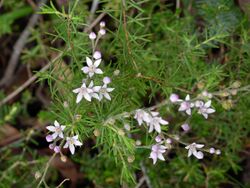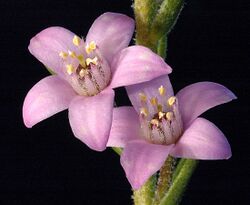Biology:Philotheca spicata
| Pepper and salt | |
|---|---|

| |
| In Kalamunda National Park | |
| Scientific classification | |
| Kingdom: | Plantae |
| Clade: | Tracheophytes |
| Clade: | Angiosperms |
| Clade: | Eudicots |
| Clade: | Rosids |
| Order: | Sapindales |
| Family: | Rutaceae |
| Genus: | Philotheca |
| Species: | P. spicata
|
| Binomial name | |
| Philotheca spicata (A.Rich.) Paul G.Wilson[1]
| |
| Synonyms[1] | |
| |
Philotheca spicata, commonly known as pepper and salt,[2] is a species of flowering plant in the family Rutaceae and is endemic to the south-west of Western Australia. It is a small shrub with linear to narrow elliptical leaves and pink, mauve or blue flowers arranged in a raceme on the ends of branchlets.
Description
Philotheca spicata is a shrub that typically grows to a height of 30–60 cm (12–24 in) and has smooth branchlets. The leaves are linear to narrow elliptical, 6–20 mm (0.24–0.79 in) long and concave on the upper surface. The flowers are arranged in leafless racemes of many flowers up to 15 cm (5.9 in) or more long with broadly elliptical bracts at the base of a thin pedicel 7 mm (0.28 in) long. The five sepals are triangular, about 1.5 mm (0.059 in) long, the petals are broadly elliptical, about 4.5 mm (0.18 in) long and the ten stamens are 2–2.5 mm (0.079–0.098 in) long. Flowering occurs from June to November and the fruit is about 3 mm (0.12 in) long with two teeth on the end.[2][3][4]
Taxonomy
This species was first described in 1834 by French botanist Achille Richard who gave it the name Erisotemon spicatus in Voyage de découvertes de l'Astrolabe - Botanique.[5][6] In 1998, Paul Wilson changed the name to Philotheca spicata in the journal Nuytsia.[7][8]
Distribution and habitat
Pepper and salt grows in sand or loam over laterite and occurs between Eneabba and Albany in the south-west of Western Australia.[3]
Conservation status
This philotheca is classified as "not threatened" by the Government of Western Australia Department of Parks and Wildlife.[2]
References
- ↑ 1.0 1.1 "Philotheca spicata". Australian Plant Census. https://biodiversity.org.au/nsl/services/apc-format/display/162053. Retrieved 14 August 2020.
- ↑ 2.0 2.1 2.2 "Philotheca spicata". FloraBase. Western Australian Government Department of Parks and Wildlife. https://florabase.dpaw.wa.gov.au/browse/profile/18529.
- ↑ 3.0 3.1 Wilson, Paul G.; Wilson, Annette J.G. (ed.) (2013). Flora of Australia (Volume 26). Canberra: Australian Biological Resources Study. p. 412. https://profiles.ala.org.au/opus/foa/profile/Philotheca%20spicata. Retrieved 14 August 2020.
- ↑ Wilson, Paul G. (1970). "A taxonomic revision of the genera Crowea, Eriostemon and Phebalium (Rutaceae)". Nuytsia 1 (1): 57. https://www.biodiversitylibrary.org/item/223300#page/63/mode/1up. Retrieved 14 August 2020.
- ↑ "Eriostemon spicatum". APNI. https://biodiversity.org.au/nsl/services/rest/instance/apni/500916. Retrieved 14 August 2020.
- ↑ Richard, Achille; Lesson, Pierre Adolphe (ed.) (1834). Voyage de Decouvertes de l'Astrolabe. Botanique 2. Paris: J. Tastu. pp. 76–77. https://www.biodiversitylibrary.org/item/15395#page/136/mode/1up. Retrieved 14 August 2020.
- ↑ "Philotheca spicata". APNI. https://id.biodiversity.org.au/instance/apni/557444. Retrieved 14 August 2020.
- ↑ Wilson, Paul G. (1998). "A Taxonomic Review of the genera Eriostemon and Philotheca". Nuytsia 12 (2): 264. https://www.biodiversitylibrary.org/item/226456#page/110/mode/1up. Retrieved 14 August 2020.
Wikidata ☰ Q5836541 entry
 |


